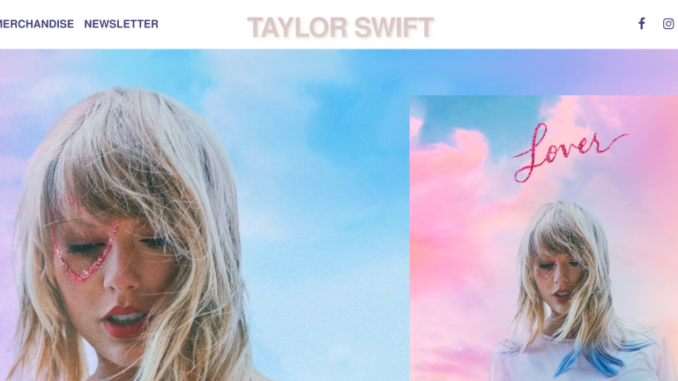
In the early days of the Internet, it could be argued that the music industry was one of the best at digital. One of the first online open communities was Iron Maiden’s early site. MySpace was a massive success in no small part due to the musical presence there, launching careers like OneRepublic and eventually selling to Justin Timberlake. Of course, MySpace is now a footnote to Facebook’s history. So what happened?
Let’s start by looking at a couple of not so random musical websites.

There’s no denying that Taylor Swift is one of the biggest pop stars going right now. Her site features four options in the menu. Events, Video, Merchandise and Newsletter. Half of the links end up further down the page, leaving only Events and Merch with their own pages. So other than merch, there’s only two pages. The leading image is her album cover, and a close up of her album cover.
This makes for really bad SEO. If you search Taylor Swift Albums, for example, her own site is nowhere to be found. Roughly 30,000 people in the US do that search every month. Add in variants (discography) and it’s more like 150K a month. There’s no self controlled news, or anything else for fans for content unless you signup for that news letter. At least it’s kind of pretty.
Let’s look at the site that unseated her a the top of the charts. Tool.

This at least features a few more user paths and content to consume. The top of the site is dominated by a very extensive video loop, and there are links to more than just the latest video they’ve produced. But it’s virtually unreadable. If you can’t see it in the screen cap, it wouldn’t be surprising. Sure it captures the dark and brooding rock star thing, but doesn’t exactly make it usable.
Further down the page you’d find this article:

If you actually click on the read more you’ll see the cover of the magazine, but on the home page only the link can be seen. The link they posted is only a bare link with the facebook tracking parameter. In addition to looking quite ugly, it’s throwing off the metrics from where ever they took the link. It’s 2019, it’s not that hard to build a link with anchor text.
So bands don’t care about product sales or websites?
Somewhere in time, Napster came along and broke the industry. But it wasn’t really Napster, it was actually iTunes. And Pandora and Spotify Broke it further. Digital downloads and physical sales are only around 25% of music revenue any more. The remaining 75% is streaming. Rather than potentially thousands of retailers for sales, the bulk is now on a few platforms. Musicians care about SEO. It’s just that that S stands for Spotify rather than search. They’ve ceded control to the big streaming platforms and they know it.
The same might be said of ticket sales for concerts. It’s pretty much ticketmaster or secondary market places. The marketplace tacks on plenty of “convenience fees” which help the company but not the musician. Somewhere upwards of 20% on average for the convenience of buying a ticket in the only place you can get one.
That means the sites are left for superfans, not acquisition. It’s made opportunities for sites that specialize in lyrics or setlists, so you can find out which artist sings that song with a single line you remember. Google’s recognized this and is pretty good at matching the entity of a single line from a song to the actual song

What should a budding artist do?
We’ve looked at big artists, and poked holes in the work they’ve done. For every superstar, there’s thousands of struggling bands trying to make a go at music for a living. What should they do to get noticed?
We’d recommend some of the classic tactics for marketing and PR. Getting noticed in an industry like music is hard, but there are pros that expressly exist to help with this. People have to hear a song somewhere to start the interest cycle. The era of self made artists isn’t over, it’s just shifted to getting noticed on platforms like YouTube and Spotify from traditional radio and record shops. Social media can help too, as long as you’re making your music easy to share and find. Social media influencers are as real in this space as the recommendation engines. If anything the splintered landscape of digital has made the possibility to get discovered from anywhere, instead of just music towns.
And of course if you like this, don’t forget to check out my soundcloud.
The post Why is the music industry bad at digital marketing? appeared first on The Future Buzz.
